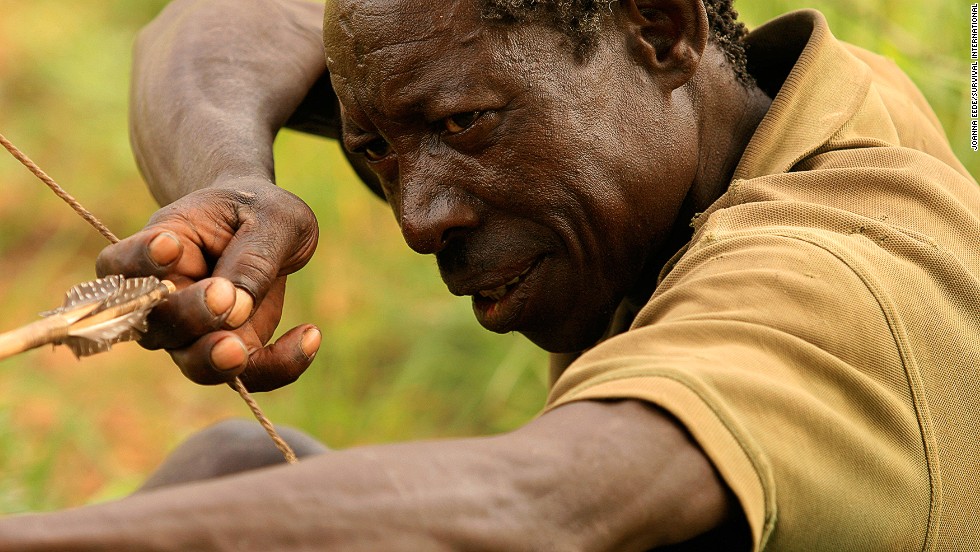
Photos: Africa's ancient hunter gatherers struggle for survival
Living with the Hadza – Until 30 years ago, the Hadza frequently hunted large animals like zebra, giraffe and buffalo. Most large mammals have now decreased in number, leaving them to depend on smaller animals, such as local antelope and birds.
Hide Caption
5 of 8
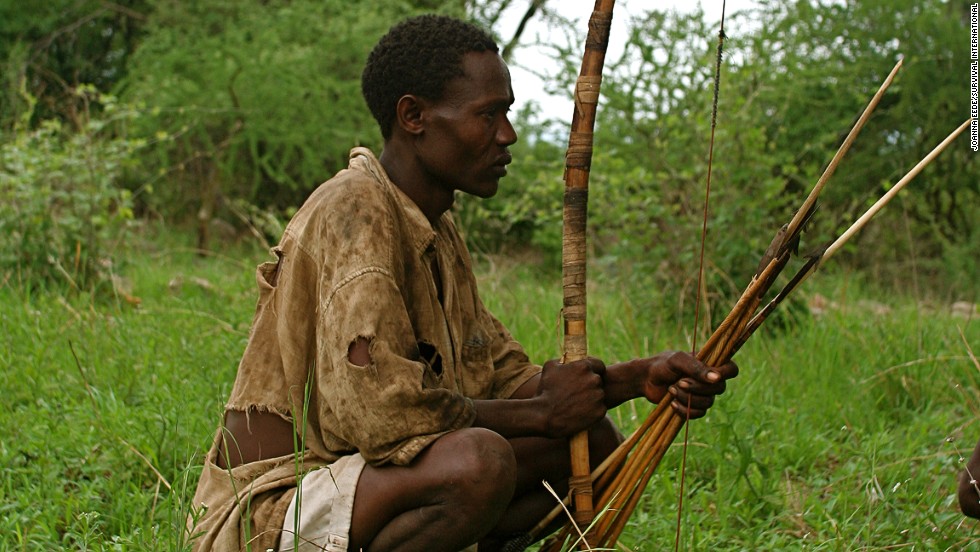
Photos: Africa's ancient hunter gatherers struggle for survival
Living with the Hadza – Finding food is a daily chore for the Hadza, and there is a division of labor along gender lines. Men hunt wild animals while women gather roots and berries. Both tasks are becoming harder, however, as the Hadza are losing their land to farmers, pastoralists and cattle herders. Their berry bushes have been cleared for crops and their forests have been razed for charcoal and water holes used for irrigation.
Hide Caption
6 of 8
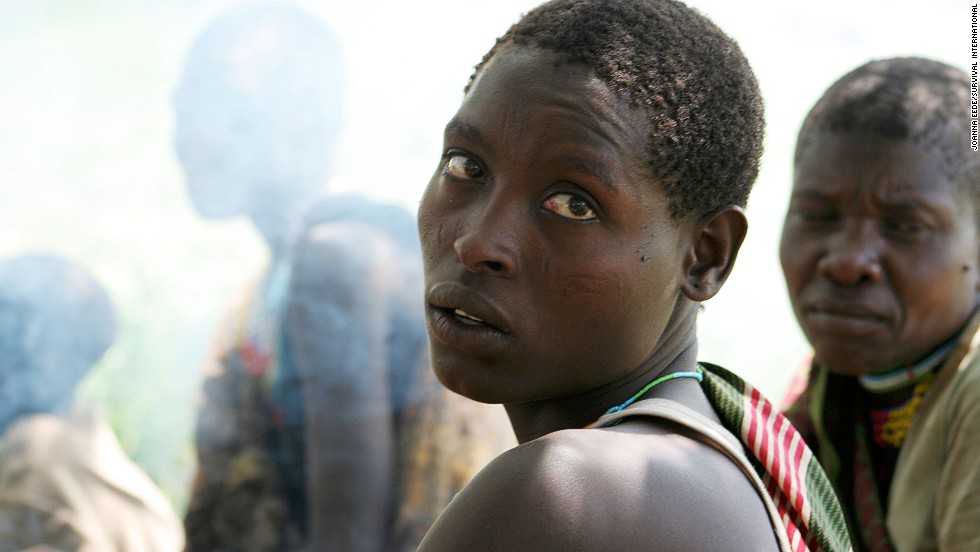
Photos: Africa's ancient hunter gatherers struggle for survival
Living with the Hadza – The Hadza value equality highly, recognizing no official leaders. Hadza women have a great amount of autonomy and participate equally in decision making with men.
Hide Caption
7 of 8
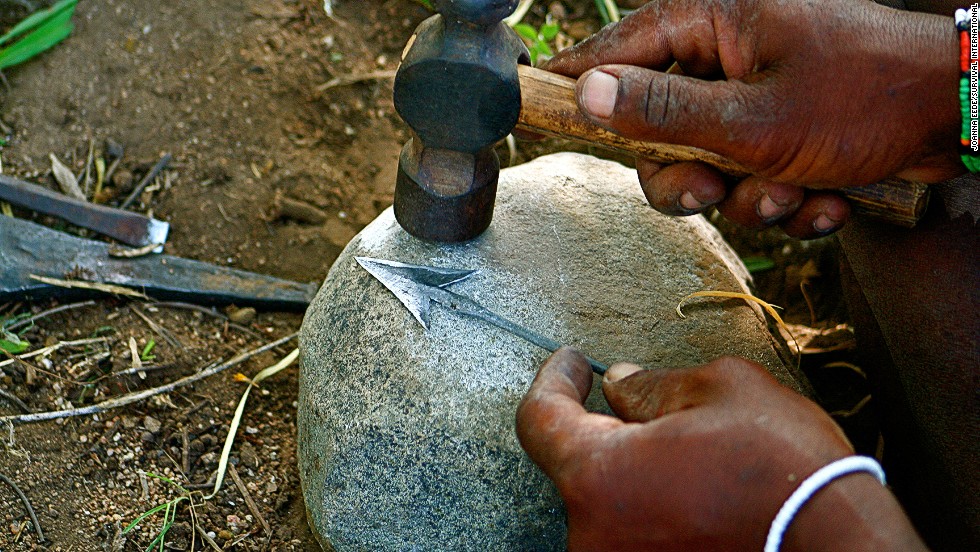
Photos: Africa's ancient hunter gatherers struggle for survival
Living with the Hadza – Hadza men hunt with hand-made arrows. They do not use snares or traps, so as not to harm other wildlife populations.
Hide Caption
8 of 8

Photos: Africa's ancient hunter gatherers struggle for survival
Living with the Hadza – Until 30 years ago, the Hadza frequently hunted large animals like zebra, giraffe and buffalo. Most large mammals have now decreased in number, leaving them to depend on smaller animals, such as local antelope and birds.
Hide Caption
5 of 8

Photos: Africa's ancient hunter gatherers struggle for survival
Living with the Hadza – Finding food is a daily chore for the Hadza, and there is a division of labor along gender lines. Men hunt wild animals while women gather roots and berries. Both tasks are becoming harder, however, as the Hadza are losing their land to farmers, pastoralists and cattle herders. Their berry bushes have been cleared for crops and their forests have been razed for charcoal and water holes used for irrigation.
Hide Caption
6 of 8

Photos: Africa's ancient hunter gatherers struggle for survival
Living with the Hadza – The Hadza value equality highly, recognizing no official leaders. Hadza women have a great amount of autonomy and participate equally in decision making with men.
Hide Caption
7 of 8

Photos: Africa's ancient hunter gatherers struggle for survival
Living with the Hadza – Hadza men hunt with hand-made arrows. They do not use snares or traps, so as not to harm other wildlife populations.
Hide Caption
8 of 8
Photos: Africa's ancient hunter gatherers struggle for survivaLiving with the Hadza – The Hadza people live in a remote part of Northern Tanzania. They have lived in the area for thousands of years, and represent one of the oldest lineages of mankind.

















Photos: Africa's ancient hunter gatherers struggle for survival
Living with the Hadza – Until 30 years ago, the Hadza frequently hunted large animals like zebra, giraffe and buffalo. Most large mammals have now decreased in number, leaving them to depend on smaller animals, such as local antelope and birds.
Hide Caption
5 of 8

Photos: Africa's ancient hunter gatherers struggle for survival
Living with the Hadza – Finding food is a daily chore for the Hadza, and there is a division of labor along gender lines. Men hunt wild animals while women gather roots and berries. Both tasks are becoming harder, however, as the Hadza are losing their land to farmers, pastoralists and cattle herders. Their berry bushes have been cleared for crops and their forests have been razed for charcoal and water holes used for irrigation.
Hide Caption
6 of 8

Photos: Africa's ancient hunter gatherers struggle for survival
Living with the Hadza – The Hadza value equality highly, recognizing no official leaders. Hadza women have a great amount of autonomy and participate equally in decision making with men.
Hide Caption
7 of 8

Photos: Africa's ancient hunter gatherers struggle for survival
Living with the Hadza – Hadza men hunt with hand-made arrows. They do not use snares or traps, so as not to harm other wildlife populations.
Hide Caption
8 of 8
Photos: Africa's ancient hunter gatherers struggle for survival
Living with the Hadza – Until 30 years ago, the Hadza frequently hunted large animals like zebra, giraffe and buffalo. Most large mammals have now decreased in number, leaving them to depend on smaller animals, such as local antelope and birds.
Hide Caption
5 of 8

Photos: Africa's ancient hunter gatherers struggle for survival
Living with the Hadza – Finding food is a daily chore for the Hadza, and there is a division of labor along gender lines. Men hunt wild animals while women gather roots and berries. Both tasks are becoming harder, however, as the Hadza are losing their land to farmers, pastoralists and cattle herders. Their berry bushes have been cleared for crops and their forests have been razed for charcoal and water holes used for irrigation.
Hide Caption
6 of 8

Photos: Africa's ancient hunter gatherers struggle for survival
Living with the Hadza – The Hadza value equality highly, recognizing no official leaders. Hadza women have a great amount of autonomy and participate equally in decision making with men.
Hide Caption
7 of 8

Photos: Africa's ancient hunter gatherers struggle for survival
Living with the Hadza – Hadza men hunt with hand-made arrows. They do not use snares or traps, so as not to harm other wildlife populations.
Hide Caption
8 of 8
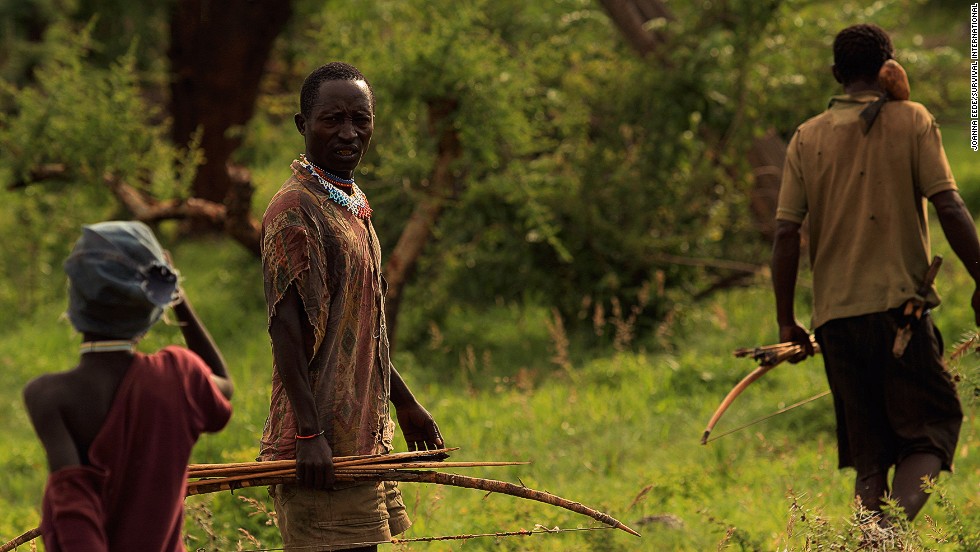
Photos: Africa's ancient hunter gatherers struggle for survival
Living with the Hadza – The Hadza people live in a remote part of Northern Tanzania. They have lived in the area for thousands of years, and represent one of the oldest lineages of mankind.Living with the Hadza – Until 30 years ago, the Hadza frequently hunted large animals like zebra, giraffe and buffalo. Most large mammals have now decreased in number, leaving them to depend on smaller animals, such as local antelope and birds.
Hide Caption
5 of 8

Photos: Africa's ancient hunter gatherers struggle for survival
Living with the Hadza – Finding food is a daily chore for the Hadza, and there is a division of labor along gender lines. Men hunt wild animals while women gather roots and berries. Both tasks are becoming harder, however, as the Hadza are losing their land to farmers, pastoralists and cattle herders. Their berry bushes have been cleared for crops and their forests have been razed for charcoal and water holes used for irrigation.
Hide Caption
6 of 8

Photos: Africa's ancient hunter gatherers struggle for survival
Living with the Hadza – The Hadza value equality highly, recognizing no official leaders. Hadza women have a great amount of autonomy and participate equally in decision making with men.
Hide Caption
7 of 8

Photos: Africa's ancient hunter gatherers struggle for survival
Living with the Hadza – Hadza men hunt with hand-made arrows. They do not use snares or traps, so as not to harm other wildlife populations.
Hide Caption
8 of 8

Photos: Africa's ancient hunter gatherers struggle for survival
Living with the Hadza – The Hadza people live in a remote part of Northern Tanzania. They have lived in the area for thousands of years, and represent one of the oldest lineages of mankind.Living with the Hadza – Until 30 years ago, the Hadza frequently hunted large animals like zebra, giraffe and buffalo. Most large mammals have now decreased in number, leaving them to depend on smaller animals, such as local antelope and birds.
Hide Caption
5 of 8

Photos: Africa's ancient hunter gatherers struggle for survival
Living with the Hadza – Finding food is a daily chore for the Hadza, and there is a division of labor along gender lines. Men hunt wild animals while women gather roots and berries. Both tasks are becoming harder, however, as the Hadza are losing their land to farmers, pastoralists and cattle herders. Their berry bushes have been cleared for crops and their forests have been razed for charcoal and water holes used for irrigation.
Hide Caption
6 of 8

Photos: Africa's ancient hunter gatherers struggle for survival
Living with the Hadza – The Hadza value equality highly, recognizing no official leaders. Hadza women have a great amount of autonomy and participate equally in decision making with men.
Hide Caption
7 of 8

Photos: Africa's ancient hunter gatherers struggle for survival
Living with the Hadza – Hadza men hunt with hand-made arrows. They do not use snares or traps, so as not to harm other wildlife populations.
Hide Caption
8 of 8

Photos: Africa's ancient hunter gatherers struggle for survival
Living with the Hadza – The Hadza people live in a remote part of Northern Tanzania. They have lived in the area for thousands of years, and represent one of the oldest lineages of mankind.
Hide Caption
1 of 8
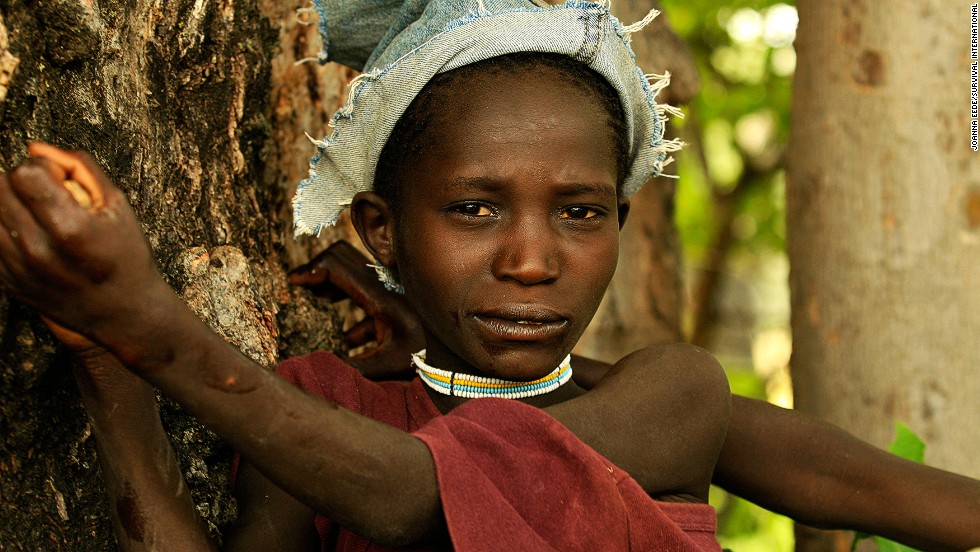
Photos: Africa's ancient hunter gatherers struggle for survival
Living with the Hadza – The Hadza face mounting challenges. In the past 50 years along, they have lost up to 90% of their land.
Hide Caption
2 of 8

Photos: Africa's ancient hunter gatherers struggle for survival
Living with the Hadza – The Hadza do not store food or cut trees to build houses. Instead, they make finding sustenance a daily activity, and build temporary huts made from dry grass.
Hide Caption
3 of 8
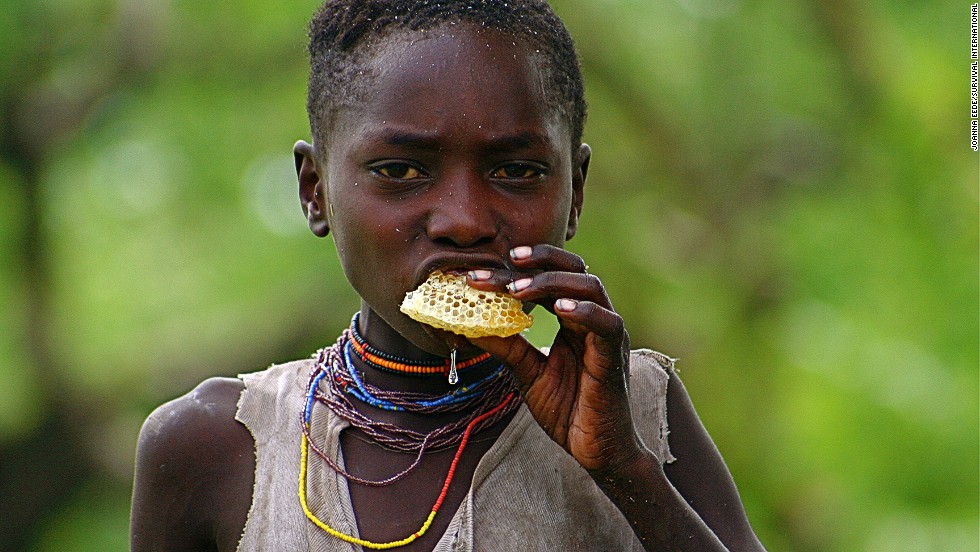
Photos: Africa's ancient hunter gatherers struggle for survival
Living with the Hadza – Wild honey makes up a large part of the Hadza diet. They rely on the honeyguide bird to direct them to beehives, and use smoke to chase the bees away. Their techniques have been passed down though generations.
Hide Caption
4 of 8

Photos: Africa's ancient hunter gatherers struggle for survival
Living with the Hadza – Until 30 years ago, the Hadza frequently hunted large animals like zebra, giraffe and buffalo. Most large mammals have now decreased in number, leaving them to depend on smaller animals, such as local antelope and birds.
Hide Caption
5 of 8

Photos: Africa's ancient hunter gatherers struggle for survival
Living with the Hadza – Finding food is a daily chore for the Hadza, and there is a division of labor along gender lines. Men hunt wild animals while women gather roots and berries. Both tasks are becoming harder, however, as the Hadza are losing their land to farmers, pastoralists and cattle herders. Their berry bushes have been cleared for crops and their forests have been razed for charcoal and water holes used for irrigation.
Hide Caption
6 of 8

Photos: Africa's ancient hunter gatherers struggle for survival
Living with the Hadza – The Hadza value equality highly, recognizing no official leaders. Hadza women have a great amount of autonomy and participate equally in decision making with men.
Hide Caption
7 of 8

Photos: Africa's ancient hunter gatherers struggle for survival
Living with the Hadza – Hadza men hunt with hand-made arrows. They do not use snares or traps, so as not to harm other wildlife populations.
Hide Caption
8 of 8

Photos: Africa's ancient hunter gatherers struggle for survival
Living with the Hadza – The Hadza people live in a remote part of Northern Tanzania. They have lived in the area for thousands of years, and represent one of the oldest lineages of mankind.
Hide Caption
1 of 8

Photos: Africa's ancient hunter gatherers struggle for survival
Living with the Hadza – The Hadza face mounting challenges. In the past 50 years along, they have lost up to 90% of their land.
Hide Caption
2 of 8

Photos: Africa's ancient hunter gatherers struggle for survival
Living with the Hadza – The Hadza do not store food or cut trees to build houses. Instead, they make finding sustenance a daily activity, and build temporary huts made from dry grass.
Hide Caption
3 of 8

Photos: Africa's ancient hunter gatherers struggle for survival
Living with the Hadza – Wild honey makes up a large part of the Hadza diet. They rely on the honeyguide bird to direct them to beehives, and use smoke to chase the bees away. Their techniques have been passed down though generations.
Hide Caption
4 of 8








Tim Spector is professor of genetic epidemiology at King's College London. The views expressed in this commentary are solely those of the writer. CNN is showcasing the work of The Conversation, a collaboration between journalists and academics to provide news analysis and commentary. The content is produced solely by The Conversation.
(CNN)Mounting evidence suggests that the richer and more diverse the community of microbes in your gut the lower your risk of disease. Diet is key to maintaining diversity and was strikingly demonstrated when an undergrad student went on a McDonald's diet for ten days and after just four days experienced a significant drop in the number of beneficial microbes.
Similar results have been demonstrated in a number of larger human and animal studies.
Your gut microbiome is a vast community of trillions of bacteria that has a major influence on your metabolism, immune system and mood. These bacteria and fungi inhabit every nook and cranny of your gastrointestinal tract, with most of this 1kg to 2kg "microbe organ" sited in your colon (the main bit of your large intestine).
We tend to see the biggest diet-related shifts in microbes in people who are unhealthy with a low-diversity unstable microbiome. What we didn't know is whether a healthy stable gut microbiome could be improved in just a few days. The chance to test this in an unusual way came when my colleague Jeff Leach invited me on a field trip to Tanzania, where he has been living and working among the Hadza, one of the last remaining hunter-gatherer groups in all of Africa.
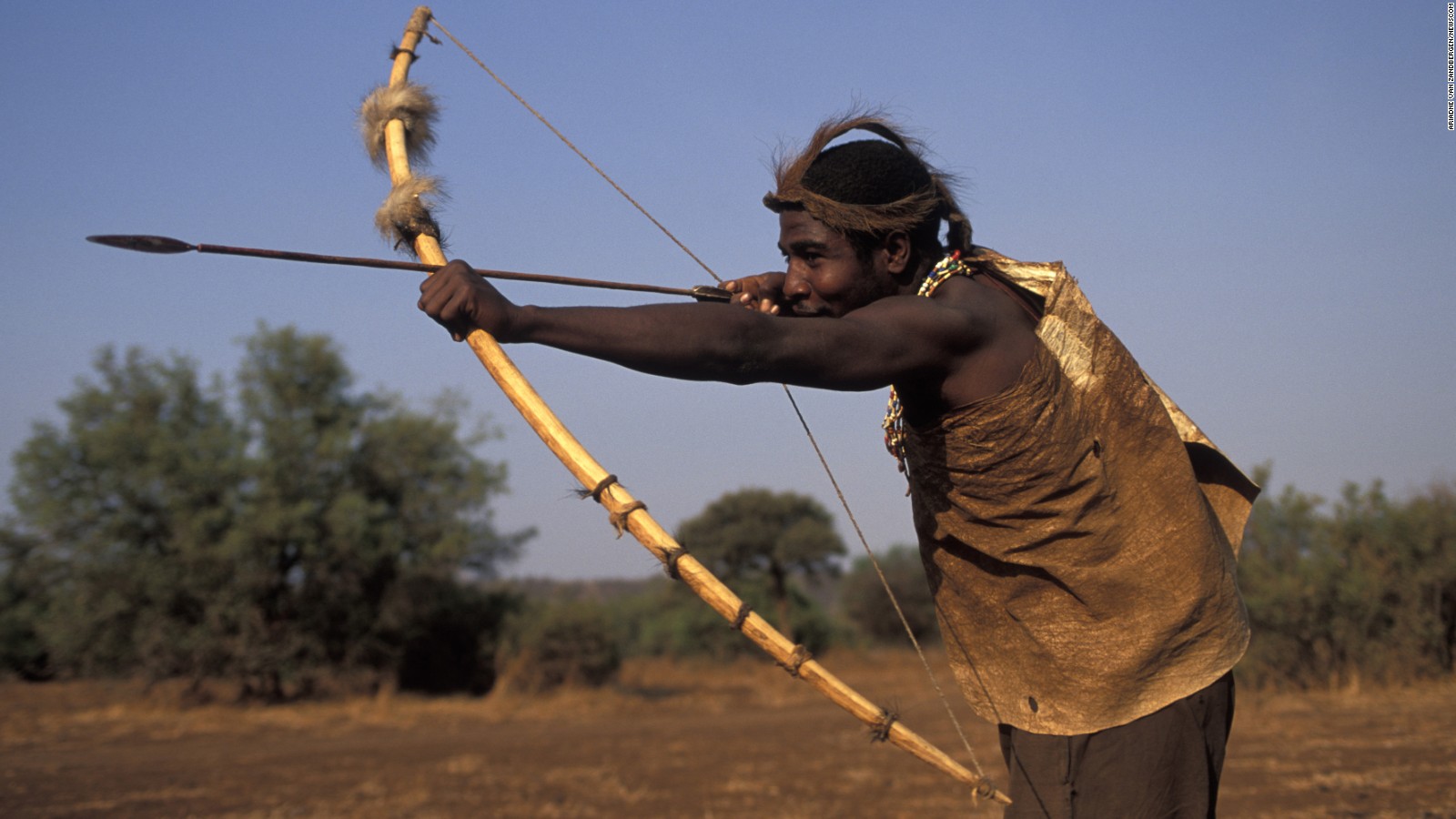
A Hadza man hunting with bow and arrow, Lake Eyasi, Tanzania.
My microbiome is pretty healthy nowadays and, among the first hundred samples we tested as part of the MapMyGut project, I had the best gut diversity -- our best overall measure of gut health, reflecting the number and richness of different species. High diversity is associated with a low risk of obesity and many diseases. The Hadza have a diversity that is one of the richest on the planet.
The research plan was devised by Jeff who suggested I should have an intensive three days of eating like a hunter gatherer during my stay at his research camp. I would measure my gut microbes before heading to Tanzania, during my stay with the Hadza, and after my return to the UK. I was also not allowed to wash or use alcohol swabs and I was expected to hunt and forage with the Hadza as much as possible -- including coming in contact with the odd Hadza baby and baboon poo lying about.
To help us record the trip I was accompanied by Dan Saladino, the intrepid presenter and producer of BBC Radio 4's The Food Programme, who was preparing a Hadza microbe special.
After a long tiring flight to Mount Kilimanjaro Airport in Tanzania, we stayed overnight in Arusha, a city in the north of the country. Before setting off the next morning, I produced my baseline poo sample.
After an eight-hour journey in a Land Rover over bumpy tracks, we arrived. Jeff beckoned us to the top of a huge rock to witness the most amazing sunset over Lake Eyasi. Here, within a stones throw of the famous fossil site of Olduvai Gorge and with the stunning plains of the Serengeti in the distance, Jeff explained that we were never going to be closer to home as a member of the genus Homo, than where we were standing at that moment.
The million-year-old diet
The Hadza seek out the same animals and plants that humans have hunted and gathered for millions of years. Importantly, the human-microbe tango that played out here for aeons probably shaped aspects of our immune system and made us who we are today. The significance of being in Hadza-land was not lost on me.
Unlike the Hadza, who sleep around the fire or in grass huts, I was given a tent and told to zip it up tight as there were scorpions and snakes about. I had to be careful where I stepped if I needed a nocturnal pee. After an interesting but restless night's sleep, a large pile of baobab pods had been collected for my breakfast.
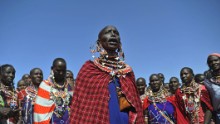




No comments:
Post a Comment